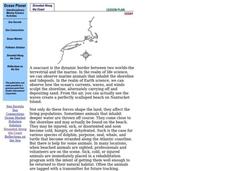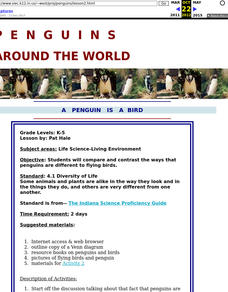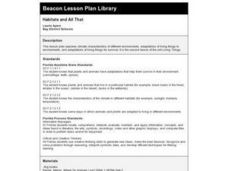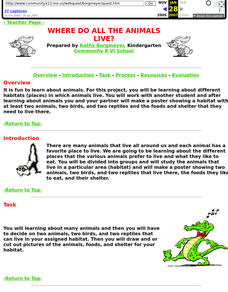Curated OER
Adaptations
Students identify what adaptation is and to research a specific mollusk. They also identify and interpret how animals get their common and scientific name and why it is Latin. Finally, students draw their shell (mollusk) and name their...
Curated OER
Search for the Humpback Whale
Students work in teams to research and explore whale adaptations, behavior, migration, habitat, communication, and interactions with humans and present their findings.
Curated OER
Geography: Lesson One
Students pretend they have been chosen to receive an elephant for a pet. Individually, they use the internet to research where elephants come from, their diet and sleeping behaviors. They identify their habitat and their characteristics...
Curated OER
Stranded Along The Coast
Students reflect and investigate how a seacoast is the dynamic border between two worlds-the terrestrial and the marine. In the realm of life science, we can observe marine animals that inhabit the shoreline and tidepools. In the realm...
National Wildlife Federation
I Speak for the Polar Bears!
Climate change and weather extremes impact every species, but this instructional activity focuses on how these changes effect polar bears. After learning about the animal, scholars create maps of snow-ice coverage and examine the yearly...
Curated OER
Wildlife
First, biology pupils research land and marine habitats along the route of skipper Rich Wilson's Great American II. Then, using colored paper clips scattered across a colored paper background, they play the predator-prey game to...
Curated OER
Turning the Tide on Trash: Marine Debris Curriculum
Six different lessons comprise this unit on marine debris. Science, language arts, social studies, and art projects make this an ideal interdisciplinary unit. The result will be well-informed future citizens who can help make a...
Monterey Bay Aquarium
What's in a Name?
Combine art and word analysis in a activity about genus and species. Elementary children sleuth out the meaning of scientific names for a number of shark species using a prefix and suffix definition chart. They then draw an image of the...
Curated OER
Penguins Around the World
Students investigate penguins. In this Science lesson, students compare and contrast penguins to flying birds. Students use a Venn diagram to illustrate the differences and similarities of penguins and flying birds.
Curated OER
Empty Oceans
In groups of four, pupils brainstorm about seafood. They view the Monterey Bay Aquarium Seafood Watch website to examine the problems caused by the seafood industry. Learners are then brought back together to discuss what they...
Curated OER
Marine Ecosystems
Students identify producers and consumers and construct a food chain from four marine ecosystems. They describe the delicate balance among organisms in each environment. In groups, students discuss the human activities that upset the...
Curated OER
Ocean Animals - A Kindergarten Research Project
Something’s fishy! Assign each of your pupils an individual sea creature and investigate the oceans. Young oceanographers utilize Kidspiration software to research a creature, illustrate an image, and create fact cards about their...
Curated OER
Habitats
Second graders identify characteristics of various habitats. In this habitats lesson plan, 2nd graders read Where the Forest Meets the Sea and Swimmy to identify the settings of different habitats. Students construct murals of different...
Curated OER
A Piece of Cake
Young scholars examine life under the sea to discover coral gardens and microhabitats. They demonstrate learning by creating an edible marine ecosystem with a sheet cake, icing, and different candies.
Curated OER
Dirty Mud
Students examine geological information to study benthic marine habitats. For this watershed project, students examine wetland habitats and land uses in a watershed. They will use geological information to discuss the impact of pollution...
Curated OER
Hudson Canyon Expedition; Fishy Deep Sea Designs!
Students explore the physical location of deep water habitats along the Hudson Shelf Valley and in Hudson Canyon. They study the basic characteristics of the mesopelagic and bathypelagic zones with regard to depth, temperature, pres
Curated OER
Group Foraging
Young scholars explore co-operation by researching ocean life. In this fish science lesson, students identify many vocabulary terms associated with oceanography and discuss what group foraging means among fish. Young scholars utilize...
Curated OER
Cypress/Tupelo Swamps
Young scholars study the geologic history of terrain, soils, and drainage patterns. They recognize ecological processes that determine the dynamic nature of habitats. They investigate the influence of human activity on the landscape.
Curated OER
A Penguin is a Bird
Pupils compare and contrast the ways that penguins are different to flying birds.
Curated OER
Habitats and All That
First graders read books, complete online explorations and discuss the ways in which animals adapt to their habitats in order to survive. They create accordion books, play matching games and dramatize animal adaptations.
Curated OER
Where Do All the Animals Live?
Students study animal habitats and make a poster showing two animals, two birds, and two reptiles in their habitats.
Curated OER
Who's Your Neighbor?
Pupils recognize and identify some of the fauna groups found in deep-sea coral reef communities. They describe common feeding strategies used by benthic animals in deep-sea coral reef communities.Students be able
Curated OER
Change Happens
Fifth graders engage in a lesson to find information about the natural history of Puerto Rico. They practice using a variety of resources for research purposes. The same process of research is used for state of Wisconsin. Then students...
Other popular searches
- Ocean Habitats
- Deep Ocean Habitats
- Ocean Habitat Diorama
- Deep Ocean Habitats
- Ocean Habitats Year 2
- Describe the Ocean Habitat
- Science Ocean Habitats
- Habitat Project Ocean
- Ocean Habitat Kindergarten
- Ocean Habitat Study
- Ocean Habitat Food Chain
- Lesson Ocean Habitat
























